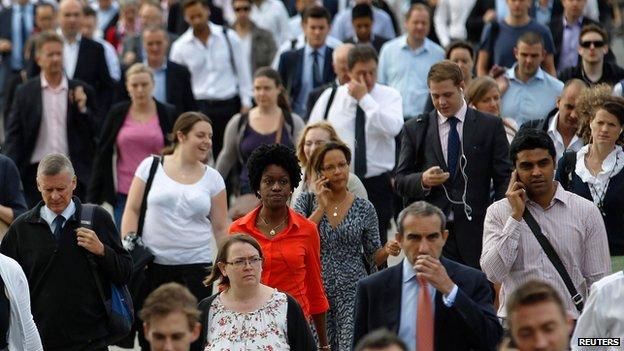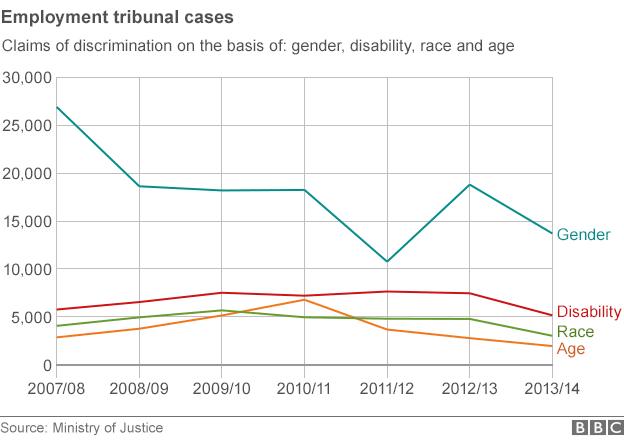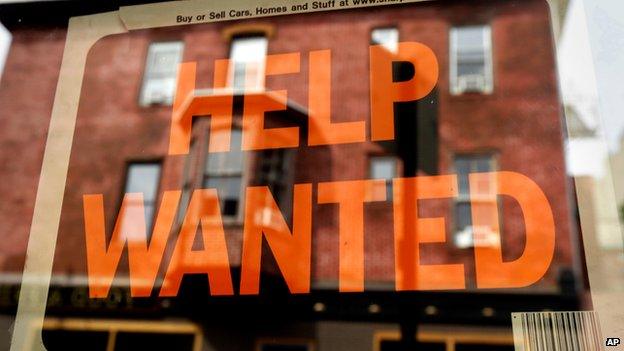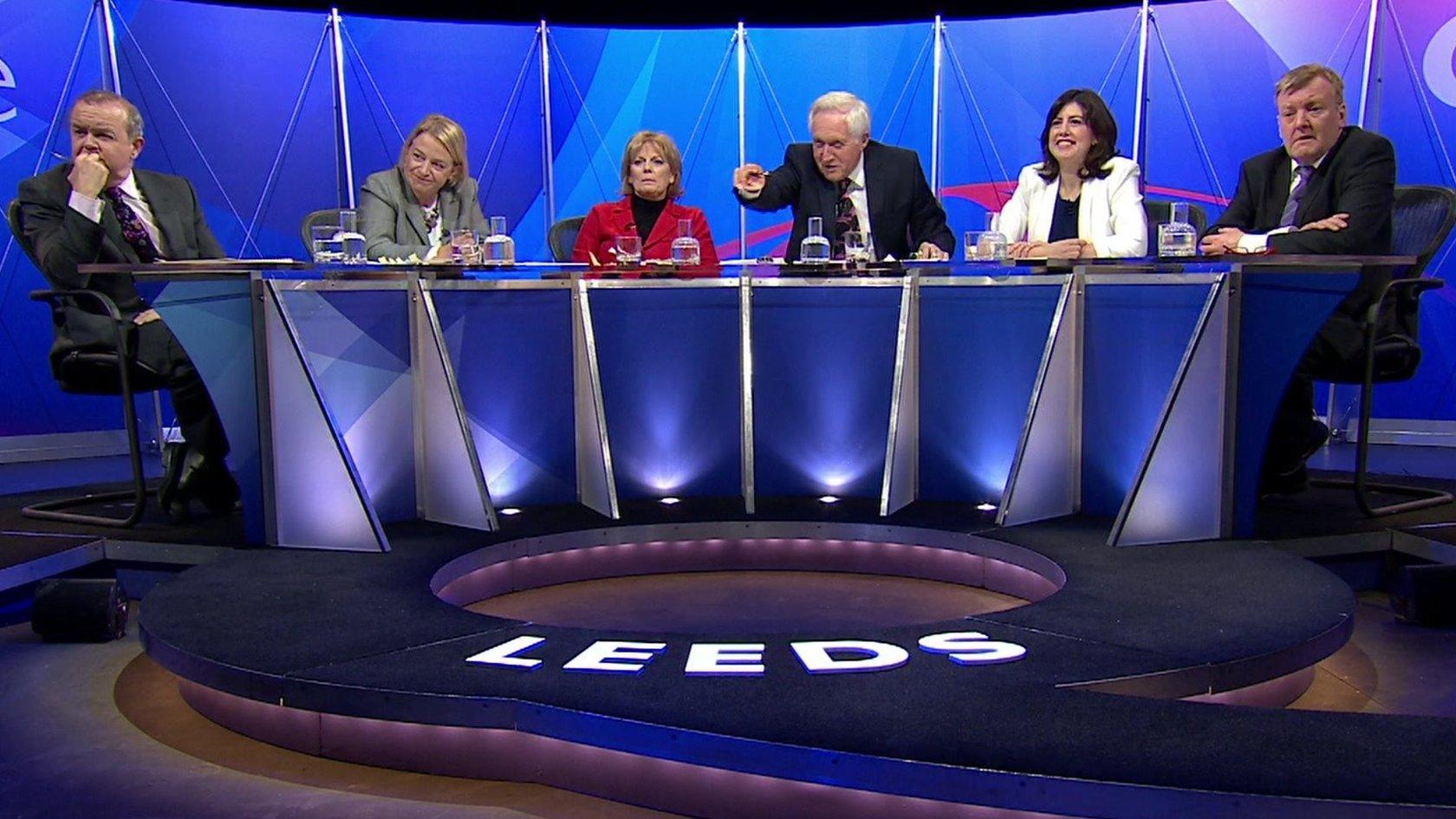Are race discrimination laws still needed in the workplace?
- Published

UK employers faced 3,064 claims from disgruntled workers in 2013-14
UKIP leader Nigel Farage has claimed that concerns over race discrimination in the workplace are outdated, and no longer relevant to his "colour-blind" party.
Mr Farage said the laws "would probably have been valid" 40 years ago, but that he would scrap many of them today.
In 2013-14, UK employers faced 3,064 racial discrimination claims from disgruntled workers, down from 4,818 in the previous year.
But experts say the sharp drop in claims is due to the introduction of tribunal fees in the same year, arguing that racism cases are as prevalent as ever.
In July 2013, the government introduced a fee of £250 for those wanting to lodge a race discrimination claim with the Employment Tribunal, and a further fee of £950 for the hearing itself.

Paula Chan, employment lawyer at Slater and Gordon, said: "Everyone has seen a drop in the number of claims - race, sex, unfair dismissal, disabilities - since the fees were introduced.
"But I haven't noticed any huge drop in race claims."
Few legal changes
Laws to protect against race discrimination in the workplace were added to the 1965 Race Relations Act in 1976.
Though the Equality Act was established in 2010, the laws around discrimination have changed very little since the 1970s, according to experts.
The earliest publically available statistics for the number of claims date back to 1998-99. In that year, 2,746 race discrimination claims were lodged, according to the Ministry of Justice (MoJ).
These accounted for a small percentage of all employment tribunals - just 3% of all employment claims.
Last year, the 3,064 race claims made up just 2% of all employment tribunals, figures show.
'Unconscious' racism
However, Ms Chan said: "I wouldn't say there are less cases today, but (racism) is less overt than it was in the 1970s."
Ms Chan also pointed out that the vast majority of claims are settled by firms out of court, in order to avoid negative publicity.
Omar Khan, director of the race equality think tank Runnymede, agreed that racism in the workplace today is "not as conscious - it's more unconscious".
As a result, he said that relying on figures for employment tribunals is not always the best measure.
The payouts involved in these cases can involve large sums of money - with the average compensation for race discrimination cases settled in court coming in at £11,203.
The largest amount paid out in 2013-14 was £162,593, MoJ records show.
'Emotive issue'
Other claims, such as unfair dismissal, sex or disability claims on average paid out more last year, and the largest average claim was paid out to age discrimination cases at £18,801.
There are also far more claims lodged for disputes over working time, unfair dismissal, equal pay or breach of contract.
But Carrie Mitchell, an employment lawyer at Morton Fraser, warned against comparing race claims with other types of employment claims.
She said: "You can't really compare race to disability or unfair dismissal claims... When it comes to sex or race people are more reluctant to bring (cases) up because it is more of an emotive issue."
For an employer, it is easy to spot failures in providing services for the disabled for example, but when it comes to race or sex "the barriers come up", said Ms Mitchell.

Black and ethnic minorities had to send out twice as many CVs to secure interviews in 2009
'Colour-blind'
For Mr Khan, scrapping race laws now would be a step backwards.
"We were colour-blind until 1965, when the laws were introduced because the colour-blind policy wasn't working," he said.
Paul Hackett, director of the think tank The Smith Institute, said the number of employment tribunal claims overall increased almost five times between 1990 and 2010 - when they hit an all time high of 240,000.
Now that people have to "jump the fee fence" the total number of claims has dropped to 193,968.
Though race accounts for a small number of these, Mr Hackett said: "The numbers are not huge because the regulations are in place - if they take away the laws we will get huge numbers. Farage is making the wrong point."
He said it was more important to ensure that the laws ensuring racial equality were enforced properly.
'Call-back' discrimination
Certainly, research by the Institute for Public Policy Research (IPPR) shows that discrimination at the first rung of employment - during recruitment - is one of the easiest incidences to measure.
An IPPR report due to be published later this month will say: "It has been found that immigrants from certain ethnic backgrounds have (on average) had to make between 10% and 150% more applications than a non-migrant in order to get a 'call-back' from a job application".
The group claimed that a 2009 study in the UK found call-back rates to be 50-90% lower for black African, black Caribbean, Chinese, Indian, Pakistani and Bangladeshi ethnic minorities.
Government statistics meanwhile show that in the same year, black and ethnic minorities had to send out twice as many CVs to secure interviews.
Mr Khan said it is not just low skilled workers who face prejudice, with black graduates from Russell Group universities more likely to be unemployed after graduating than their white classmates.
For Ms Chan, the cases extend beyond colour and are "more likely" to be centred around nationality.
She said: "I've worked in Scotland and London, and in a more diverse place such as London it is absolutely not about colour - people can be harassed for their accent, their ideas."
- Published12 March 2015

- Published12 March 2015

- Published12 March 2015
